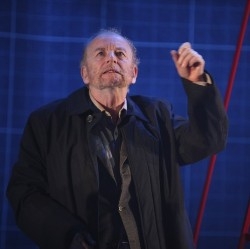A Life of Galileo (Birmingham REP)

© Birmingham Repertory Theatre
What I originally anticipated as a heavy-going, educational evening at the theatre turned into an insightful and refreshingly light journey of one of the greatest academics the world has ever known. Roxana Silbert, directing Brecht's Galileo, proves a master of her craft, embracing Mark Ravenhill's translation of the text and demonstrating that a production can portray both anguish and joy in equal measure. From light humour and song to forced abjuration and imprisonment, the balance is well executed, ensuring the audience remain engaged throughout.
Ian McDiarmid deserves a special mention; in the title role he shines as the likeable and slightly eccentric intellectual, compelled by and devoted to his life's work. The ensemble are strong and consistent, and all seem happy to be reprising their roles for a production which first opened over a year ago, in-house at The RSC.
Though set in the 17th Century, the production is modern. The set resembles that of a quirky IKEA showroom, quite in keeping with the new and contemporary Birmingham REP. Captions above the stage provide dates and events, allowing us to put Galileo's life into perspective. Across the years we observe his rise in popularity and meet a variety of characters, from young students fascinated and fixated by his teachings, to his daughter, Virginia, and his fellow academics, who are all too eager to applaud his inventions and praise his work. It is from a fleeting comment that the storyline stems, as Galileo's landlady remarks that his scientific teachings contradict the Church's beliefs.
Galileo set out to prove that the sun was fixed and that it was the earth that moved, a statement we are now certain of, but he was later silenced by the Holy Office after being accused of heresy.
It is during Act 2 that the production takes a pivotal turn, as Galileo is forced to recant. It is difficult to accept that the pursuit of knowledge was a punishable offence; how one man was silenced for attempting to make a great discovery and unveil the fascinating truth after devoting a life to study. In today's world, where we are encouraged to live and speak so freely with so few boundaries in our way, Galileo would not have been punished, but encouraged. The final scene relays this, ending on a poignant note as Italian border patrol search for books containing religious words. The words that have since caused conflict, hatred and war. Today it is science that is more widely accepted. As Galileo said: "We cannot teach people anything; we can only help them discover it within themselves."
A Life of Galileo is showing at The Birmingham REP until Sat 8 March 2014.
– Jenna Harvey










